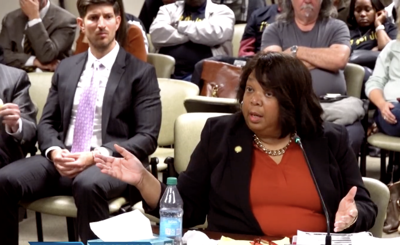All allegations of ethical misconduct brought against District 1 Metro Councilmember Joy Kimbrough by a local liquor distributor have been dismissed.
Best Brands CEO alleges councilmember misused office for personal benefit
After a hearing that stretched on for more than seven hours on Monday, the Metro Board of Ethical Conduct unanimously voted to dismiss the claims, which stemmed from an ethics complaint filed in August alleging Kimbrough asked for hundreds of thousands of dollars in exchange for her support of a rezoning proposal.
Ryan Moses, CEO of Nashville-based liquor distributor Best Brands, brought forth the complaint, alleging Kimbrough requested a proposed community benefit plan of $150,000 be increased to $500,000 and that she would control where the funds were allocated. According to Moses’ claims, Kimbrough asked for the funds in exchange for her support of a zoning ordinance to allow for a warehouse project on an Ashland City Highway property where Moses sought to expand Best Brands headquarters.
Kimbrough has repeatedly denied the allegations and continued to do so at the hearing.
“I have never demanded, solicited, requested or asked for any amount of money for myself or on behalf of my community from Mr. Moses,” Kimbrough said during her opening statement. She added that the rezoning request had also lacked support from the Metro Planning Commission and other councilmembers when it was proposed a separate time in 2023.
Kimbrough’s legal counsel called a series of witnesses who mostly cited the rezoning proposals' lack of support from the community.
But the bulk of Monday’s hearing centered on the contents of the three-minute cellphone conversation in April 2025 in which Kimbrough allegedly requested the $500,000. No recording of the call was provided despite text messages — filed as evidence in the case — sent by Moses to Kimbrough in which he said he had “listened” to their conversation several times with his uncle.
Moses said at the hearing that he lied about the existence of a recording as a way to urge Kimbrough to discuss the project with him and have her admit that she had requested the money.
The board members said they had expected a recording to be presented, and board member Kinika Young said she saw that falsity as one of several misrepresentations by Moses. Board chair Diane Di Ianni said this “truly bothered” her and made her question the reliability of Moses' other claims.
Filing that alleges the councilmember demanded community benefits in exchange for rezoning support
“That, I will say, concerned me, when our job is to assess credibility,” Di Ianni said.
The board ultimately voted 4-0 to dismiss the claims, and the lack of evidence was seemingly the deciding factor.
“It obviously is a challenging case because it comes down to a three-minute call for which there’s no recording,” said Di Ianni. “So we’re based on what one person said and understood, what the other person said and understood, and memories. It makes it challenging.”
When the dismissal vote passed, a group of Kimbrough’s supporters cheered, many of them wearing T-shirts reading, “I’ve got Joy!”
This article was first published by our sister publication, the Nashville Post.






